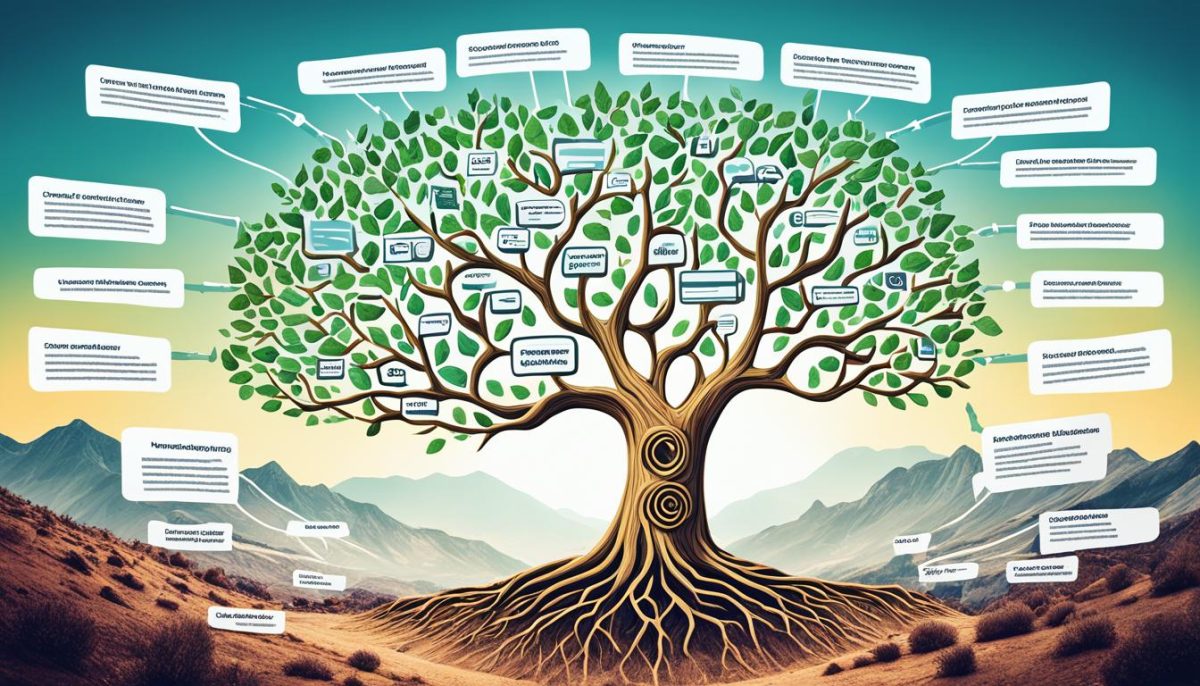In this section, we will explore the concept of content marketing within the realm of digital marketing. We are excited to delve into the exciting world of content marketing in the digital landscape and shed light on its significance in driving brand engagement and growth.
Content marketing is a powerful strategy that involves creating and distributing valuable, relevant, and consistent content to attract and retain a target audience. It goes beyond traditional advertising by providing informative, educational, or entertaining content that resonates with consumers.
In the digital marketing realm, content marketing plays a crucial role in establishing a brand’s authority, increasing organic traffic, and cultivating long-term customer relationships. By offering valuable content, businesses can position themselves as trusted industry leaders.
Through effective content marketing, businesses can engage their audience at various touchpoints along the customer journey. From blog posts and social media updates to videos and podcasts, content marketing provides a diverse range of formats to reach and connect with consumers.
We invite you to join us as we dive deeper into the role of content marketing within digital marketing strategies. Let’s explore how this powerful approach can help your business thrive in the digital landscape.
The Role of Content Marketing in Digital Marketing Strategies
In today’s digital landscape, content marketing plays a vital role in driving successful marketing strategies. By leveraging the power of valuable and relevant content, businesses can effectively engage their target audience, establish brand authority, and drive organic traffic. Content marketing goes beyond traditional advertising methods, focusing on providing value and building relationships with customers.
When integrated into digital marketing strategies, content marketing serves as a powerful tool for attracting, educating, and converting prospects into loyal customers. By creating compelling and informative content, businesses can capture the attention of their target audience and build trust in their brand. Through consistent content creation, companies can position themselves as industry leaders and experts, enhancing their credibility in the eyes of consumers.
One of the key advantages of content marketing in digital marketing strategies is its ability to drive organic traffic to websites and other online platforms. Unlike paid advertising methods, content marketing allows businesses to reach their audience through search engine optimization (SEO) and social media. By creating valuable and optimized content, companies can improve their search engine rankings, resulting in increased visibility and higher website traffic.
Moreover, content marketing is a cost-effective strategy that offers long-term benefits. While traditional advertising methods require a continuous investment, well-crafted content has the potential to generate leads and drive conversions over time. By focusing on creating evergreen content that remains relevant and valuable, businesses can continually attract and engage new customers without constantly allocating additional resources.
“Content marketing is not only about generating leads and driving sales; it’s about building relationships and providing value to our audience.”
When developing digital marketing strategies, content marketing must be integrated as a core component. By aligning content creation with overarching marketing goals, businesses can leverage the power of storytelling to connect with their audience authentically. The content produced should be tailored to meet the needs and interests of the target audience, providing solutions, insights, and entertainment.
In conclusion, content marketing plays a crucial role in digital marketing strategies. It enables businesses to reach their target audience, establish brand authority, and drive organic traffic. By creating valuable and relevant content, companies can position themselves as industry leaders and engage customers on a deeper level. When effectively integrated into digital marketing strategies, content marketing serves as a powerful tool for driving brand growth and success.

Key Components of an Effective Content Marketing Strategy
Building an effective content marketing strategy requires careful planning and consideration of key components. By incorporating these elements into your strategy, you can establish a solid foundation for success. Let’s explore the essential aspects that contribute to an effective content marketing strategy.
- Identifying Target Audience Personas: Before creating any content, it’s crucial to understand your target audience. Develop detailed personas that capture their demographics, interests, pain points, and preferences. This knowledge enables you to tailor your content to meet their specific needs, ensuring maximum engagement and relevance.
- Creating Valuable and Relevant Content: Content is king in the digital landscape. To attract and retain your audience, consistently deliver high-quality content that provides value and addresses their challenges. Incorporate various formats, such as blog posts, videos, infographics, and podcasts, to cater to different preferences and enhance engagement.
- Implementing a Distribution Plan: It’s not enough to create great content; you need to ensure it reaches the right audience. Develop a comprehensive distribution plan that includes leveraging social media platforms, email marketing, influencer partnerships, and search engine optimization (SEO) techniques. By strategically promoting your content, you can expand its reach and increase brand visibility.
To visualize the key components of an effective content marketing strategy, refer to the table below:
| Component | Description |
|---|---|
| Target Audience Personas | Develop detailed profiles of your target audience, including demographics, interests, and pain points. |
| Valuable and Relevant Content | Create high-quality content that provides value and addresses your audience’s challenges. |
| Distribution Plan | Implement a comprehensive plan to distribute your content across various channels for maximum visibility. |
Incorporating these key components in your content marketing strategy will help you build a solid framework for attracting, engaging, and converting your target audience. Now let’s move on to the next section where we explore how to measure the success of your content marketing efforts.
Measuring the Success of Your Content Marketing Efforts
Tracking the success of your content marketing efforts is crucial in determining the effectiveness of your campaigns. By measuring key metrics and using the right tools, you can gain valuable insights to optimize your strategy and maximize your impact.
One important metric to consider is engagement. By analyzing metrics such as likes, shares, comments, and time spent on page, you can gauge how well your content resonates with your audience. High engagement rates indicate that your content is capturing attention and driving interaction.
Another essential measure is conversions. Tracking the number of leads generated, email sign-ups, or purchases made as a result of your content can help you assess its impact on your bottom line. Conversions provide tangible evidence of your content’s ability to drive action and achieve your desired goals.
Finally, the return on investment (ROI) is a critical metric in measuring content marketing success. By calculating the financial outcome of your content marketing efforts compared to the cost of producing and promoting your content, you can determine if your investment is yielding positive returns.

